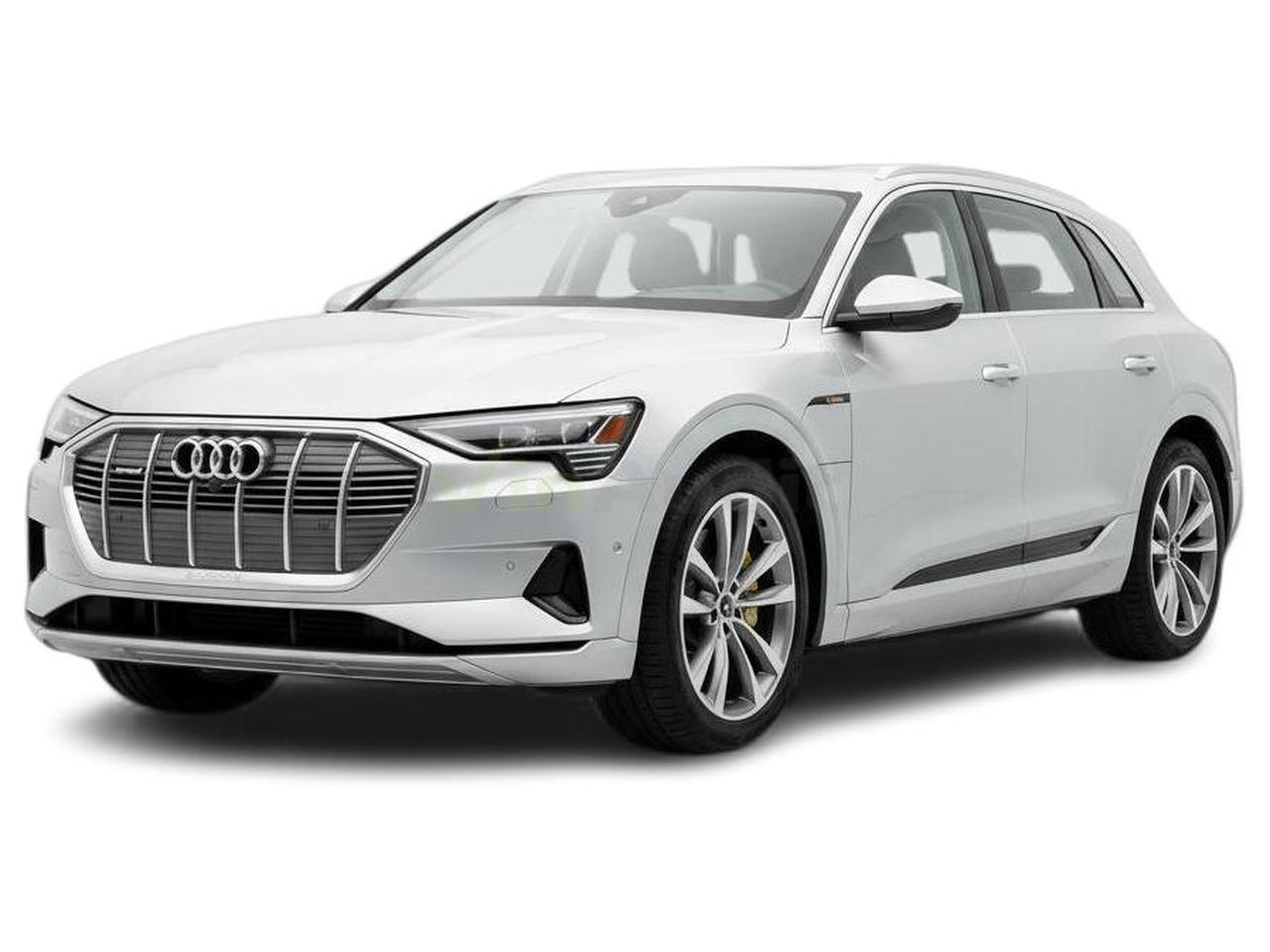The 2019 Audi e-tron marked Audi's entry into the all-electric SUV market. It boasts a comfortable and luxurious ride. This SUV body style was offered from 2019 onward. Key trims included Premium, Premium Plus, and Prestige. The original pricing ranged roughly from $75,000 to $85,000. Its blend of Audi luxury with electric power made it popular.
The Good
The 2019 Audi e-tron offers strong performance with instant torque from its electric motors. It boasts a luxurious and comfortable interior, and its sleek design provides aesthetic appeal. For the practical buyer, it offers electric efficiency and a lower running cost than gasoline vehicles. For emotional appeal, the instant torque and luxurious features create a sense of refined power.
The Bad
The 2019 Audi e-tron's weaknesses include a relatively limited range compared to some competitors and the official EPA range was lower than expected for an EV. Early models experienced software glitches. Be cautious of the charging port door which could experience issues. Additionally, tire wear can be accelerated due to the vehicle's weight and instant torque.
2019 Audi e-tron: Quick Overview
- Engine Options: Dual asynchronous electric motors
- Horsepower: 402 hp (with Boost mode engaged)
- Fuel Economy: EPA estimated 74 MPGe combined
- 0–60 Times: Around 5.5 seconds (with Boost mode)
- Towing Capacity: 4,000 lbs (with optional towing package)
- Trim-Level Features:
- Premium:
- Adaptive air suspension
- Navigation
- Heated front seats
- Panoramic sunroof
- Audi pre sense basic and front
- Premium Plus: (Adds to Premium)
- Bang & Olufsen sound system
- Top view camera system
- Audi adaptive cruise assist
- Lane keep assist
- Prestige: (Adds to Premium Plus)
- Massaging front seats
- Head-up display
- Power soft-closing doors
- Dual-pane acoustic glass
- Premium:
All trims featured standard all-wheel drive (quattro), a 95 kWh battery pack, and fast DC charging capability. Trim levels primarily differentiated themselves through comfort, convenience, and advanced driver-assistance features.
2019 Audi e-tron Specifications
Vehicle Information
| Year | 2019 |
| Make | Audi |
| Model | E-tron |
| Trim | - |
| Style | All-Wheel Drive |
| Type | - |
| Category | - |
Manufacturing Details
| Made In | - |
| Manufacturing City | - |
Dimensions
| Doors | - |
| Curb Weight | - |
| Gross Vehicle Weight Rating | - |
| Overall Height | - |
| Overall Length | - |
| Overall Width | - |
| Wheelbase Length | - |
| Standard Seating | - |
Engine & Performance
| Engine | - |
| Engine Size | - |
| Engine Cylinders | - |
| Transmission | - |
| Transmission Type | - |
| Transmission Speeds | - |
| Drivetrain | All-Wheel Drive |
Additional Features
| Anti-Brake System | - |
| Steering Type | - |
Pricing
| Manufacturer Suggested Retail Price (MSRP) | - |
| Invoice Price | - |
| Delivery Charges | - |
Vehicle History Report
Specifications
History
Events
History Check
Check
Check
Check
Check
Listings
Recalls
Check
Analysis
What Problems Does the 2019 Audi e-tron Have?
Frequently reported problems for the 2019 Audi e-tron include issues related to the charging system, such as slow charging speeds or inconsistent charging behavior. Some owners have also reported software glitches that affect the infotainment system or driver-assistance features. A notable recall was issued for potential battery fires, which involved a fix to the battery pack sealing.
Long-term reliability concerns revolve around the battery's degradation over time and the longevity of the electric motors. Some owners have also experienced issues with the air suspension system, particularly with maintaining consistent ride height. While not widespread, issues with the MMI system freezing or malfunctioning have been reported. The charging port door mechanism has also proven to be a weak spot prone to failure. Proper maintenance and adherence to Audi's recommended service schedule are crucial to mitigating potential issues.
How long will the 2019 Audi e-tron last?
Based on owner data, a well-maintained 2019 Audi e-tron can realistically provide 150,000 to 200,000 miles or 10-12 years of service before major repairs become necessary. Battery degradation is a key factor, and owners may see a reduction in range over time. Regular software updates and diligent adherence to the recommended maintenance schedule are crucial for long-term durability. Weaknesses over time include potential issues with the air suspension, infotainment system, and charging components. Battery health monitoring is recommended to assess the remaining capacity and overall condition.
What Technology & Safety Features are Included?
The 2019 Audi e-tron comes equipped with a plethora of tech features. The standard infotainment system features dual touchscreens: a 10.1-inch upper screen for infotainment and an 8.6-inch lower screen for climate control and vehicle settings. Apple CarPlay and Android Auto are standard. Audi's Virtual Cockpit, a 12.3-inch digital instrument cluster, provides customizable information displays.
Driver-assistance features include standard Audi pre sense basic and front, which provide automatic emergency braking and pedestrian detection. Optional features include adaptive cruise assist, lane keep assist, and a top view camera system.
Safety features encompass airbags, stability control, and anti-lock brakes. Optional features include rear cross-traffic alert and blind-spot monitoring. The NHTSA gave the 2019 e-tron a 5-star overall safety rating. The IIHS named it a Top Safety Pick+, demonstrating excellent performance in crash tests.
What Colors Options are Available?
Exterior Colors
Interior Colors
2019 Audi e-tron Prices and Market Value
The 2019 Audi e-tron had a starting MSRP of around $74,800 when new. Current used market prices generally range from $30,000 to $45,000, depending on the trim level, mileage, and condition. Depreciation has been significant, typical for EVs and luxury vehicles. Factors affecting resale value include battery health, mileage, accident history, and the availability of newer electric vehicles with longer ranges. The demand for electric SUVs and government incentives also influence resale prices.
2019 Audi e-tron Cost of Ownership
Insurance costs for the 2019 Audi e-tron are generally moderate to high, reflecting its luxury status and repair costs. Fuel costs (electricity) are significantly lower than gasoline vehicles. Maintenance is generally less frequent compared to ICE vehicles, but repairs can be expensive due to specialized components. Long-term ownership costs are moderate, driven by depreciation, insurance, and potential battery replacement costs. Overall, it's more economical than a comparable gasoline-powered luxury SUV but not the cheapest EV to own.
2019 Audi e-tron Fuel Efficiency
2019 Audi e-tron Safety Rating
NHTSA
2019 Audi e-tron Insurance
reasonable repair costs.
How Does the 2019 Audi e-tron Compare to Other Vehicle?
The 2019 Audi e-tron competes with the Tesla Model X, Jaguar I-Pace, and BMW iX. In terms of performance, the Model X offers quicker acceleration, while the e-tron focuses on a comfortable ride. The I-Pace offers similar performance but with a sportier feel. The BMW iX (later models) offer comparable or superior range and technology.
Feature-wise, the e-tron matches its rivals in luxury and technology, though Tesla's Autopilot system is often considered more advanced. Reliability is a mixed bag; the e-tron has had some reported issues, while Tesla's reliability has also been questioned. Price-wise, the e-tron was competitive when new, but used prices can vary significantly.
Alternatives to consider include the Tesla Model Y for longer range and charging network access, or the Jaguar I-Pace for a sportier driving experience. For a more modern and tech-focused experience, a newer BMW iX or Cadillac Lyriq could be a better option, though at a higher price point.
Ranks #820 SUV
| 1 | 2023 Toyota 4Runner | (5.0★) |
| 2 | 2023 Honda CR-V Hybrid | (5.0★) |
| 3 | 2023 Lexus GX | (0.0★) |
| 4 | 2024 Mazda CX-90 PHEV | (0.0★) |
| 5 | 2024 Subaru Crosstrek | (5.0★) |
| 6 | 2024 BMW iX | (0.0★) |
| 7 | 2023 Ford Bronco Sport | (3.0★) |
| 8 | 2023 Mercedes-Benz EQB | (0.0★) |
| 9 | 2024 Chevrolet Trax | (5.0★) |
| 10 | 2023 Audi A4 allroad | (0.0★) |
| 11 | 2023 Hyundai Kona N | (0.0★) |
| 12 | 2023 Nissan ARIYA | (5.0★) |
| 820 | 2019 Audi e-tron | (0.0★) |
Final Verdict: Is the 2019 Audi e-tron a Good Vehicle?
The 2019 Audi e-tron is ideal for buyers seeking a comfortable, luxurious, and relatively quiet electric SUV experience. It’s worth buying used if you can find one at a good price and are aware of its limitations, particularly the range. A Premium Plus trim offers a good balance of features and value. It's best suited for those who primarily drive in urban or suburban environments and have easy access to charging. Consider a thorough inspection, including battery health, before purchasing. If range is a primary concern, exploring newer EV models might be more suitable.

